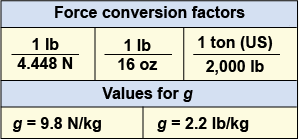|
Weight is a force that results from the action of gravity on mass. At Earth’s surface, gravity attracts all masses downward with a force of 9.8 N/kg. This gravitational force is called weight, which is calculated by multiplying its mass by the strength of gravity in newtons per kilogram. For example, a 10 kg object has a weight of 9.8 N/kg × 10 kg = 98 N. 
|
| (5.1) | | | Fw | = | weight force (N) | | m | = | mass (kg) | | g | = | acceleration of gravity = 9.8 N/kg at Earth’s surface |
| Weight
|
|
The value of 9.8 N/kg is used so often that it has its own symbol, g. When you see “g” in an equation such as F = mg, substitute the strength of gravity at Earth’s surface g = 9.8 N/kg. You may sometimes see g with different units, such as g = 9.8 m/s2. This is an equivalent definition because 1 N of force is defined as the force that causes a 1 kg object to accelerate at 1 m/s2. 
|
Weight is not mass. Mass is measured in kilograms and grams. Weight is measured in newtons or pounds. The source of confusion is that we use weight to measure mass! When you place an object on an electronic balance, the sensor in the balance measures the force of gravity acting on the object. Since this force is proportional to mass, a calculation done inside the balance divides the force by 9.8 N/kg to read mass in kilograms, or by 0.0098 N/g to read mass in grams. A balance calibrated to work on Earth will not be accurate on the Moon or anyplace where gravity is not exactly the same as it is on Earth. In the extreme case, far from any planet or star, an object will still have mass, but it may be weightless because of the absence of gravity. 
|

| In the SI system, equation (5.1) relates weight in newtons to mass in kilograms. To use the equation, the units of each value must be in the same system—if force is in newtons and g is in newtons per kilogram, then mass must be in kilograms. Many physics problems will require that you convert from everyday units, such as pounds, to units that work with an equation in SI units, such as newtons. Do the conversions before substituting any values into the equation to calculate a result. |

 |
One pound is equal to 4.448 newtons. Where does that conversion factor come from? Some people think that one kilogram equals 2.205 pounds. By now, you should realize that this is not correct because kilogram is a unit of mass and pound is a unit of weight. You can’t convert directly between two different quantities, such as mass and force!
Instead, we can say that one kilogram of mass experiences a force of gravity at the Earth’s surface equivalent to the force of 2.205 pounds. The weight in newtons of one kilogram is Fw = mg = (1 kg)(9.807 m/s2) = 9.807 N. This is equivalent to 2.205 lb, so we can generate the conversion factor for force by dividing one by the other: (9.807 N)/(2.205 lb) = 4.448 N/lb. Remember, you can convert units only within one type of physical quantity! 
|
If a person has a weight of 125 lb, then what is that person’s mass in kilograms? | Asked: | mass | | Given: | weight Fw = 125 lb | | Relationships: | equation for weight: Fw = mg
conversion factor: (444.8 N)/(1 lb) = 1
acceleration due to gravity: g = 9.8 N/kg | | Solution: | Convert weight from pounds to newtons: Calculate mass using weight equation: | |  | 
|
How many newtons of gravitational force is exerted on a man with a mass of 80 kg who is standing on the Moon, where g = 1.6 N/kg? - 128 N
- 64 N
- 784 N
- 50 N
 |
The answer is a. Force = (mass) × (acceleration due to gravity) = 80 kg × 1.6 N/kg = 128 N 
|

